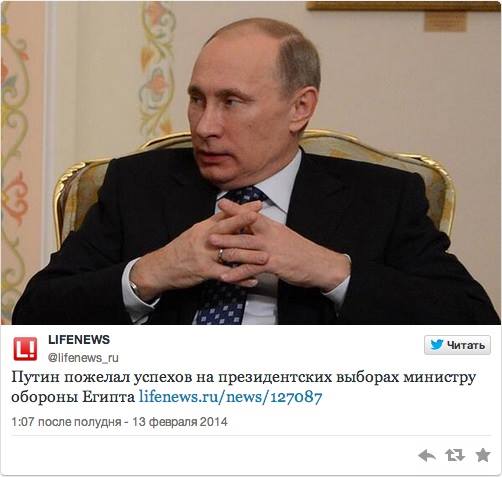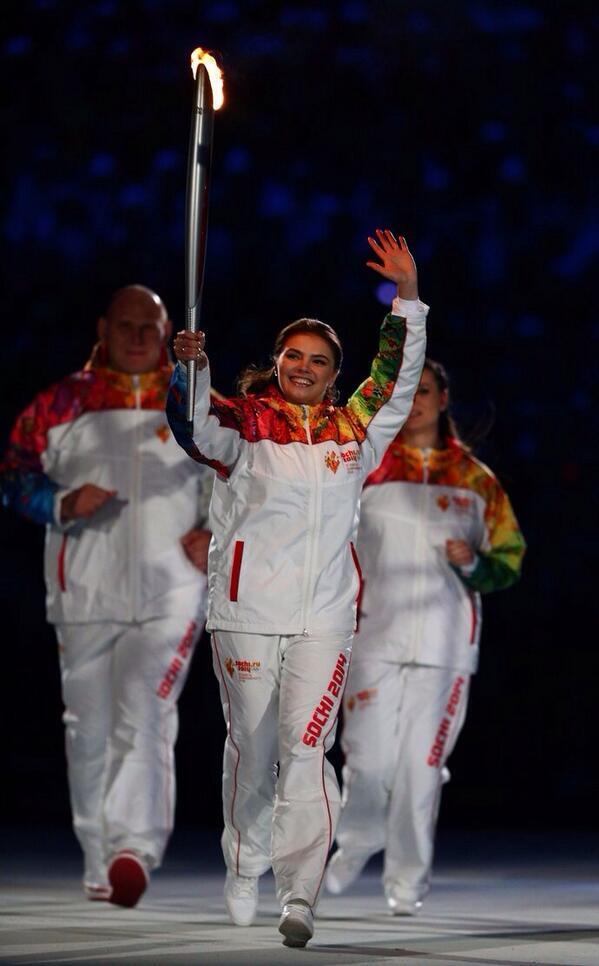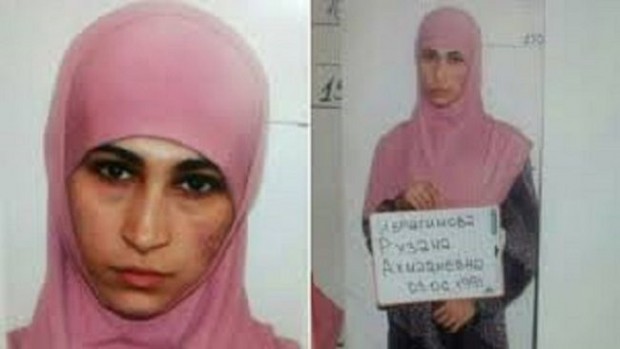Welcome to The Interpreter’s Sochi 2014 Winter Olympics Liveblog. Here, we will be covering the news away from the ski jumps and ice rinks, where activists are being arrested, corruption looms large, and the terrorist threat is very real. See all of our Sochi coverage here, and read Wednesday’s Sochi Liveblog: Hot Environment and Jailed Environmentalists. Updates are below:
2057 GMT: It appears that Vladimir Putin may soon be announcing a celebration of a more personal nature than the Sochi Olympics. Both he and retired gymnast (and Olympic torch bearer) Alina Kabayeva have been seen wearing wedding rings. The two are rumoured to have been in a relationship for a while now, though the president has not made any public declaration in this regard.
Wedding ring spotted on Putin’s hand. Earlier, Kabayeva was seen wearing a ring. Come on, break it now! http://t.co/JbchmWWx5d
— Leonid Ragozin (@leonidragozin) February 13, 2014


2032 GMT: Vladimir Putin has left the Sochi Olympics to hold a meeting about Russia’s slowing economy. With the value of the ruble tumbling, and economic growth in 2013 slowing far below expectations, many experts have argued that Prime Minister Dmitry Medvedev may be made the scapegoat for the stagnation.
Putin started out by asking Economic Development Minister Alexei Ulyukayev to report on finding ways to give momentum to an economy whose growth slowed to 1.3 percent last year. Russia’s traditional source of business activity – high crude prices, which have steadily held above $100 a barrel – did not help.
Seeking to spur progress on economic incentives and execution of his populist campaign promises, Putin started with a meeting on Jan. 15, and has since held them every two weeks. Wednesday’s meeting was the third in the series that is thought to be a bad omen for Medvedev, who was in attendance.
Read the entire Moscow Times article, translated by Johnson’s Russia List.
2025 GMT: In response to the US passing sanctions against Russian officials who were implicated in the death of Sergei Magnitsky, Russia banned Americans from adopting Russian children. Now Russia has passed even further restrictions on adoptions. CNN reports:
Russian Prime Minister Dmitry Medvedev has signed a decree banning foreign same-sex couples — as well as single people from countries where same-sex marriages are legal — from adopting Russian children…
The portion affecting singles appears to stem from concerns Russian lawmakers have publicly expressed that single prospective adoptive parents could turn out to be gay and enter a same-sex marriage in their home countries.
2005 GMT: In the weeks ahead of the Sochi Olympics, Russian officials warned that a “black widow,” a 22-year old Dagestani woman named Ruzana Ibragimova, had reached Sochi and could be planning an attack.
But five days into the Olympics, officials have retracted that warning:
“We still have not found her,” Senior Lieutenant Sergei Polukhin of the Sochi FSB told The Moscow Times in a rare interview. The newspaper described Lieutenant Polukhin as being “oddly forthcoming” about the case.
Lieutenant Polukhin added that Ms. Ibragimova “may never have left Dagestan in the first place.”
Now the question is whether Russian officials are trying to hide the fact that they haven’t caught any “black widows” by downplaying the threat, or was the initial intelligence wrong in the first place. Regardless, security is still a concern at this Olympic games.
Yesterday, The Interpreter’s managing editor spoke to Boston College professor Matt Sienkiewicz and terrorism expert and Northeastern University professor Max Abrahms about the terrorist threat in Sochi, and the impact of the games on the long-term security outlook for both Russia and Western countries like the United States. Listen to our podcast below or in a separate window:
2000 GMT: The problems at the Sochi Olympics are well known, and both the international community and the Russian opposition has been quick to point them out. But for many Russians, even those upset with Putin and Sochi’s corruption, the Olympics also represent a sad lost opportunity. What should be a great event and a sign of national pride has been darkened by the decisions of Russia’s politicians.
That tension is reflected in an article by the liberal outlet, Slon, which examines the impact of the Olympics and the criticism of “Sochi Problems.”
Read What’s the Meaning of the Russian Olympic Games? Caught between corruption and national pride.
1620 GMT: Russia has spent $51 billion on their Olympic facilities, most of which have been funded by taxpayer money. But both the private and public financiers of these Olympics need to see some positive economic effects once these Olympics are over.
But it’s not clear what will happen to Sochi after the Games. Many of Sochi’s facilities were designed to be modular, so that they could be moved afterwards, because Sochi is not really a destination hotspot for winter sports. But the moving of the facilities was deemed too expensive, and those plans have been scrapped, at least for now. Many of the investors have called for Sochi to become a gambling zone, and for some of the buildings to be converted to casinos, but Putin has said that he opposes this plan.
With “Sochiproblems” being a popular hashtag on social media, even Russian President Vladimir Putin has expressed concerns that the non-Olympic facilities (the hotels, apartment buildings, housing, and other venues not specifically designed for the events) are not up to standard. If the facilities in and around the Olympic games are not good enough to use after the Olympics, this will be yet another obstacle in the efforts to recoup the expenditures.
Today, Dmitry Medvedev has said that answering these questions is now a priority:
Medvedev issued an order on the government’s website on Friday urging the government as well as a charitable foundation supported by the country’s richest men to present proposals for the post-Olympic use of venues by the end of the month.
Helping the government to figure out the best way to manage the venues will be the Fund for Supporting Olympians of Russia, which has some of Russia’s richest men as its members, including Roman Abramovich and Oleg Deripaska.
The Audit Chamber, the government’s auditing agency, last year raised concern about the legacy of the Olympic venues. Its chairman Sergei Stepashin quoted expert estimates that the maintenance of the venues would cost Russia at least 60 billion rubles a year ($2 billion).
The rest of Russia’s economic outlook is also not good. Just today, Kommersant warned that the value of the Russian ruble has plummeted against the value of most other world currencies. Solving the Sochi problem will play a part in whether Russia’s recent economic stagnation improves, stays the same, or gets worse.
